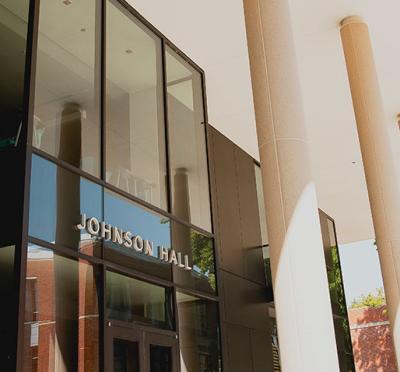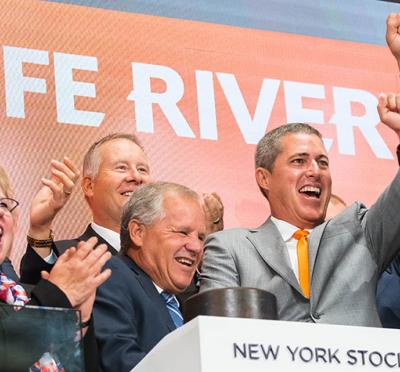Brad Heller (’09 Computer Science) is in many ways the prototypical Portland, Oregon, tech start-up guy — he’s scary-smart, works hard and plays hard, yet doesn’t take himself too seriously. He may work as the high-powered director of engineering for Cloudability, one of Portland’s most-buzzed about new tech companies, but he’s not above heading to the video game store at midnight to get his hands on the much-anticipated release of Grand Theft Auto V. (While waiting in line he tweeted: “We are older than everyone else by like 5 years.”) His Twitter bio reads: computer nerd@cloudability.com metalhead. beer nerd. timbers fan. wannabe musician.
Cloudability, along with other Portland startups such as Janrain, Puppet Labs, and Urban Airship, is gaining major attention and investment. With support from some several tech incubators, Cloudability last year raised $8.7 million in funding. The company keeps attracting customers as well as accolades: CEO Mat Ellis recently was honored with the Oregon Entrepreneur Award, and Cloudability was rated one of the top 15 young companies in the nation to work for, according to a survey by Turnstone and the Wharton School.
We caught up with Heller in Cloudability’s downtown office to discuss Portland’s start-up boom, and how Oregon State University prepared him for life in the tech world’s fast lane.
Q: Tell us a bit about cloud computing and Cloudability.
A: It used to be that companies would set up their own data centers. Now you can go online with a credit card and rent space on someone else’s server — that’s the “cloud.” At Cloudability, we make sure companies are using those servers efficiently. We have a set of tools for monitoring how much a company is spending and how well they’re utilizing the cloud. Our sweet spot is big companies who employ lots of engineers who are all using the cloud, and the finance department needs to figure out how to control costs.
Q: The Portland start-up scene is definitely drawing lots of notice nowadays. What’s the view like from the inside?
A: Everyone is super-supportive and willing to help out. If someone needs to cover rent, they can always find someone to help them out with a bit of contract work. It’s the Portland spirit — a very strong community. I also find that it’s more laidback here, and that people are more accessible than they are in some of the larger markets, like Seattle, and certainly Silicon Valley. A lot of that has to do with the lifestyle here. There’s more of a work-life balance. A lot of our meetings after hours are at the pub over a beer.
Working here is definitely exciting. The team is amazing. Everyone wants to be the best at what they do — our marketing people want to be the best, our sales people want to kill their numbers. I wouldn’t trade my team (engineering) for anything.
Cloud analytics is still new, and it’s going to get a lot bigger.
Q: When did you become interested in computers?
A: I grew up in Bend (Ore.), and I was pretty much always a computer nerd. I was writing code pretty early, like 8 or 9. I always liked building things, and when you’re writing software you’re building something with virtually no resources — it seemed unbounded, and that made it exciting. At first I didn’t think I was smart enough to do all the math to study computer science. It was going to be either computer science or journalism, but I got a job covering high school sports for the local newspaper, and decided to study computer science instead.
Q: What was your experience like at Oregon State?
A: Great. I took a lot of terrific courses. My philosophy when I was in college was that it was going to be very important to have real-world experience, so I made sure that I always had a job through college. I worked doing IT for a company I really love in Corvallis called ViewPlus, which makes Braille printers. The founder was an ex-professor at OSU (John Gardner, physics professor emeritus). I also did some work for the Business Solutions Group at the College of Business. I got a lot out of all those experiences outside the classroom.
Then my senior year, my capstone project for computer science ended up turning into a contract with Microsoft. The project was a data collection service that uses SMS (text messaging) as its transport layer. I got to go overseas with Microsoft to deploy it for the ministry of health in Uganda, which was using it to help midwives in rural parts of the country to do reporting. They would use the data to see what regions needed extra supplies, that sort of thing. It eventually got deployed to places like Vietnam and China, too.
Q: You co-founded your own startup before joining Cloudability. What did you take from that experience?
A: After graduating and working at Jive and WebMD, I started Revisu, which was a collaboration tool for graphic designers. We were running that for about a year. What did I learn? To begin with, we didn’t address the market needs very well. Being with Cloudability, I’ve learned a lot about working with customers. I also didn’t delegate responsibilities very well. I tried to do almost everything — meeting with investors, sales, writing code. So I learned a little — no, a lot — about business management, too. Projecting my life forward, I know I’m going to do another startup, and I’m basically going to do everything differently.
I was lucky in that while we were at the Portland Incubator Experiment, I actually sat next to the Cloudability guys. After I had successfully crashed and burned my startup, I knew I wanted to work at Cloudability.
Q: What qualities are you looking for when you hire engineers?
A: I do a lot of hiring, and it’s hard to find engineers. It’s really hard to find good engineers, and we’re really picky about who we are. One thing I take notice of is people that have the core fundamentals. Unfortunately, the bar for entry seems to be getting lower because the tools are getting easier to use, but we’re losing those fundamentals you learn taking classes at a place like OSU — formal languages, algorithms, compilers. Those things are the bread and butter of what we are doing.



